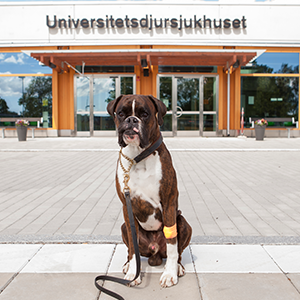Contact
The Unit for Internal Communication and Management Support, internkommunikation@slu.se, is part of the Communications Department.

The Government is investing SEK 30 million per year in a permanent reinforcement for SLU to stabilise the operation of the University Animal Hospital (UDS).
The animal hospital is a key infrastructure for veterinary education and research in Sweden. Its operation is both complex and costly.
- The addition is welcome and much needed. This reinforcement will create the conditions to stabilise the operation of the animal hospital. The investment is important not only for education and research but also for Sweden to be able to reverse the national shortage of veterinarians in the long term, says Rector Maria Knutson Wedel.
The number of pets and horses is increasing in Sweden, so the demand for licensed veterinarians and veterinary nurses is growing. The situation is similar across Europe. There is also a great need for veterinary expertise in rural areas and the food industry. On behalf of the government, work has been under way for some years to substantially increase the number of places on the veterinary and veterinary nurse programmes at SLU. Large parts of the clinical elements of the programmes take place at the animal hospital.
- It is gratifying that the government, in a situation where there are many societal needs, has been able to prioritise the investment in the animal hospital,’ Knutson Wedel continues.
UDS has had financial problems for a long time. Following a reorganisation, the animal hospital has been part of the Department of Clinical Sciences at the Faculty of Veterinary Medicine and Animal Science (VH) since the beginning of the year. The faculty is now delighted.
- Now it's up to us to manage this opportunity well, says Rauni Niskanen, Dean of VH. The investment gives us new financial conditions, but does not mean that our important work of developing the organisation and the workplace can stop. We are now continuing our journey with an organisation that we can all be proud of, Rauni concludes.
The Unit for Internal Communication and Management Support, internkommunikation@slu.se, is part of the Communications Department.